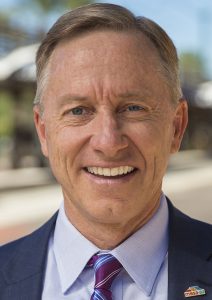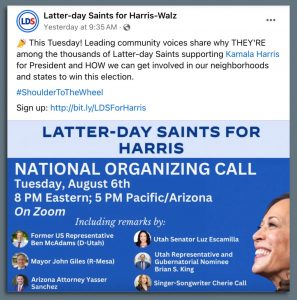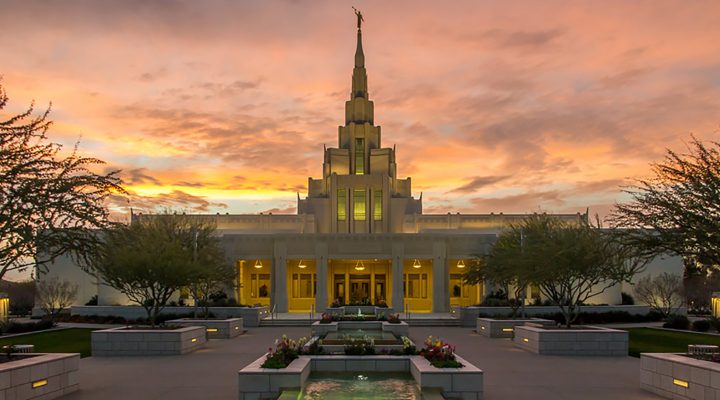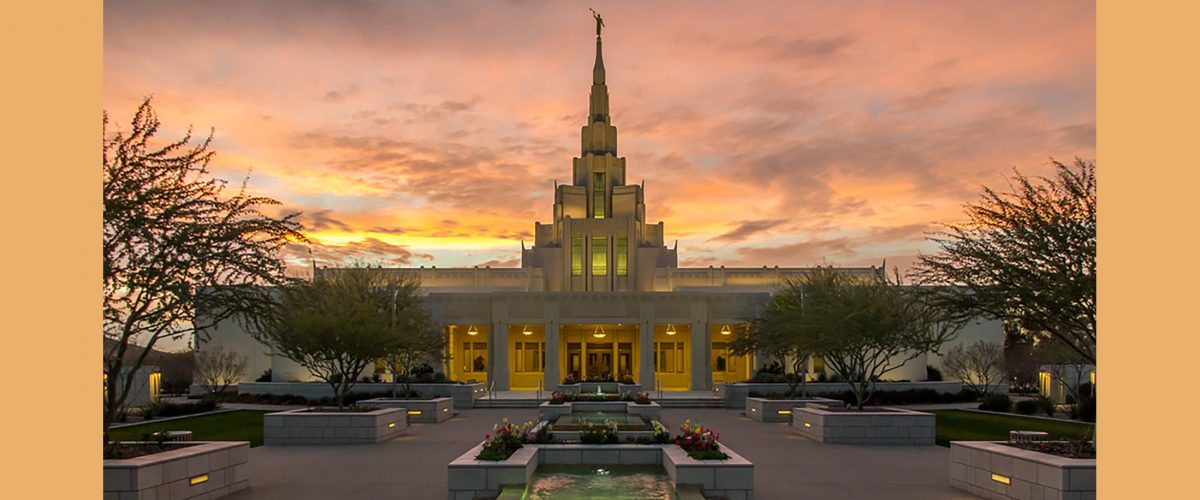When the Republican mayor of Mesa, Ariz., endorsed Kamala Harris for president, the significance wasn’t just his party affiliation. Mayor John Giles also is a member of the Church of Jesus Christ of Latter-day Saints.
As anyone who pays attention to Electoral College politics knows, Arizona is a swing state that will have outsized influence on the outcome of the 2024 presidential election. Arizona voters narrowly helped Joe Biden win the White House in 2020, and the state’s 11 electoral votes are close to essential to win the national election. Eight of the past 12 presidential election winners also won Arizona.
And one bloc of voters holds enough sway to tip the election one way or the other: Mormons.
The LDS Church counts about 450,000 members in Arizona, accounting for 6% of the state’s population.
More than half the LDS members in Arizona do not like Donald Trump, according to polling.
More than half the LDS members in Arizona do not like Donald Trump, according to polling. And Trump’s presence on the ballot in 2016 and 2020 dropped the GOP share of the state’s vote below 50% for the first time since 1996. While the share of Arizonans voting for the Democratic nominee in 2000, 2004, 2008, 2012 and 2016 did not shift much, the share voting for the Republican candidate dropped 5 points when Trump became the standard bearer.
In 2020, Biden chalked up a 4-point gain among Arizona voter compared to Hillary Clinton in 2016 and a nearly 5-point gain compared to Barack Obama in 2012.

John Giles
As far back as July 2023, 51% of Latter-day Saints nationwide said they held negative views of Trump. They also were twice as likely to have a “very unfavorable” view of him than a “very favorable” opinion of him.
While LDS voters often get lumped in with white evangelicals, polling continues to show they are distinct. That same July 2023 poll found 67% of white evangelical Protestants holding favorable views of Trump.
In Arizona specifically, new polling shows the tide turning in favor of Harris already, compared to where opinions stood when Biden was still to be the Democratic nominee.
One commentator said in March of this year: “The fate of American democracy rests squarely in the hands of members of the Church of Jesus Christ of Latter-day Saints.”
Now, the Harris campaign is organizing LDS voters. A Latter-day Saints for Harris online event Aug. 6 drew about 1,400 participants from 48 states, organizers said.
Giles, the Mesa mayor, has said he has some genuine enthusiasm for the Harris-Walz ticket but sees their primary asset as not being Donald Trump.
“We need to broaden the Republican Party so that non-MAGA voices aren’t told to get the hell out of the room,” Giles told Arizona PBS. “If Republicans get tired of losing, they’ll have to broaden their perspective and not get rid of people like me.”
Latter-day Saints for Harris is one among several faith-based groups popping up to support the Harris campaign. Others include Christians for Kamala and Evangelicals for Harris.
Three other factors are likely to affect voter turnout in Arizona in November.
“A lot of us recall those four years as a national nightmare.”
The first is a citizen-initiated measure that would enshrine the right to abortion until fetal viability, typically around 24 weeks. That was sparked by the state Supreme Court ruling in April that a near-total abortion ban from 1864 could be enforced.
 The second is immigration. Republican leaders like Giles do not believe the Trump administration handled the border crisis well.
The second is immigration. Republican leaders like Giles do not believe the Trump administration handled the border crisis well.
“Some of us have short memories,” Giles said told Arizona PBS. “A lot of us recall those four years as a national nightmare.”
Republicans have placed on the November ballot a measure that would make it a state crime for noncitizens to cross the border from Mexico into the state except at a lawful port of entry. Police officers could arrest those who did so and judges could order that people be deported back to their home countries under the proposal.
Third is an important U.S. Senate race. Sen. Kyrsten Sinema — who was elected as a Democrat and now is an independent — is not seeking a second term. The race for her seat is between Democratic Rep. Ruben Gallego and Republican Kari Lake, a former television anchor who made an unsuccessful bid for governor in 2022.
Thus Arizona — and its large LDS population — could swing not only the presidential election but also control of the Senate.
Related articles:
Mormons and the 2020 presidential election: It’s complicated | Analysis by Mark Wingfield
2020 vote shows religious identity held steady with slight change among Catholics and Mormons
How evangelical and Mormon deconstruction is playing out on TikTok and YouTube | Analysis by Rick Pidcock
MAGA evangelicals cast aspersions on new Evangelicals for Harris group
‘Christians for Kamala’ reaches 40,000 people
Have you heard that Tim Walz is … a Lutheran?


